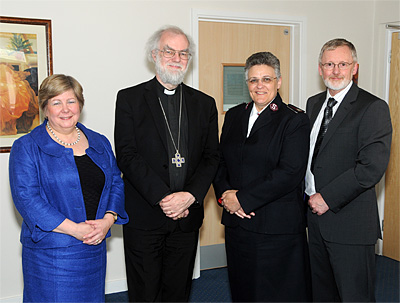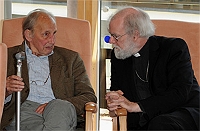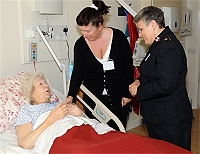Archbishop - Vulnerable people need respect
Thursday 17th June 2010
The Archbishop of Canterbury visited The Princess Alice Hospice to meet with patients and to gain a deeper understanding of the impact of the Government's End of Life Care Strategy.
Doctor Jane Latham, Director of Clinical Services, the Archbishop of Canterbury, Commissioner Betty Matear and Nicholas Ratsey, Chief Executive of the hospice © andynewbold.com
The Archbishop spoke about the support and respect given by the carers that allows patients to make decisions, which in turn gives them a sense of living actively. The charity has long been recognised as a leading voice in palliative care.
The Archbishop was joined by Betty Matear, Commissioner of The Salvation Army and Moderator of the Free Churches Group. The Archbishop and Commissioner are two of the four presidents of Churches Together in England, a national body which unites denominations such as the Roman Catholic Church in England and Wales and the Methodist Church of Great Britain. The organisation had requested the visit in order to encapsulate the holistic and ethical issues involved in caring for patients and their families and the impact of the Government's End of Life Care Strategy.
 During their visit they took the opportunity to make a series of private visits to patients. Reflecting afterwards, the Archbishop expressed how patients at vulnerable and difficult stages of their life have rapid need to feel the respect and patience of those around them. He accepted that it is a difficult job for carers - family members and professional staff - but that he had been able to observe how the care and support provided enabled patients to make decisions in their own lives and to continue living actively.
During their visit they took the opportunity to make a series of private visits to patients. Reflecting afterwards, the Archbishop expressed how patients at vulnerable and difficult stages of their life have rapid need to feel the respect and patience of those around them. He accepted that it is a difficult job for carers - family members and professional staff - but that he had been able to observe how the care and support provided enabled patients to make decisions in their own lives and to continue living actively.
He spoke of how impressed he was by the commitment of the Hospice team to communicate with the community, not just through strong education projects but also through the creation and development of a network with the charity shops, local schools and by offering periods of work experience. By reaching out, the charity is able to offer a shared vision to the community. Stating that he thought it was imperative that local people provided support. He spoke not just of financial support but also how Christians in the area could take their teachings and volunteer at the Hospice.
Click link on the right to listen to the Archbishop's reflections [2Mb]
 The Commissioner wanted the community to realise that the provision of care was not just the practices in the building; but that a large amount of care takes place in the wider community in patients' homes and that, more people than they initially thought would be affected by the work of the Hospice. She spoke about the importance of a multi-disciplinary team, and how she had observed individuals treated with respect and valued as people; and how the physical, emotional and spiritual care they receive is of great benefit, allowing patients and their families to make decisions that are right for them.
The Commissioner wanted the community to realise that the provision of care was not just the practices in the building; but that a large amount of care takes place in the wider community in patients' homes and that, more people than they initially thought would be affected by the work of the Hospice. She spoke about the importance of a multi-disciplinary team, and how she had observed individuals treated with respect and valued as people; and how the physical, emotional and spiritual care they receive is of great benefit, allowing patients and their families to make decisions that are right for them.
Having spoken to patients, she remarked on how she saw a real measure of emotion when they told her what the Hospice meant to them. The challenge to local faith leaders is in applying these values and to having regard for all people and the impact they can have at all stages of their life.
Click link on the right to listen to the Commissioner's comments [2Mb]
Nicholas Ratsey, Chief Executive of the charity, said:
'When the request for us to facilitate a visit from The Archbishop of Canterbury and Commissioner Matear came from Churches Together in England, the Hospice team felt honoured and proud that our achievements as a leading voice in the End of Life Care arena had been recognised'.
